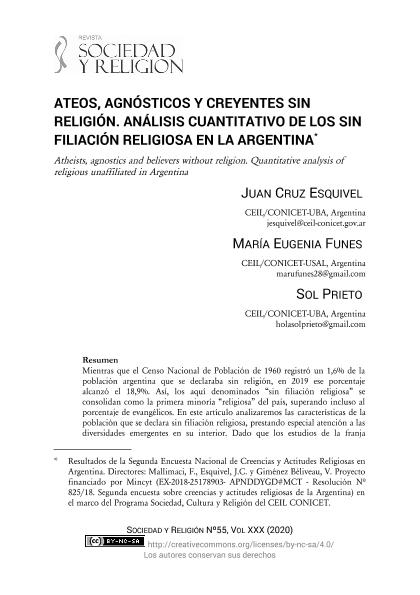Artículo
Mientras que el Censo Nacional de Población de 1960 registró un 1,6% de la población argentina que se declaraba sin religión, en 2019 ese porcentaje alcanzó el 18,9%. Así, los aquí denominados “sin filiación religiosa” se consolidan como la primera minoría “religiosa” del país, superando incluso al porcentaje de evangélicos. En este artículo analizaremos las características de la población que se declara sin filiación religiosa, prestando especial atención a las diversidades emergentes en su interior. Dado que los estudios de la franja poblacional que afirma no identificarse con religión alguna han sido infrecuentes en Argentina, emprenderemos un análisis cuantitativo del segmento de la sociedad que más ha crecido en las últimas décadas. Preguntarnos por las creencias, prácticas y actitudes frente a temas de agenda pública de este segmento poblacional nos permitirá mostrar un proceso complejo que integra distanciamiento de las instituciones religiosas sin pérdida de religiosidad -creyentes sin religión institucional- con situaciones de increencia religiosa -agnósticos y ateos. Mostraremos que si bien los individuos que componen este segmento comparten una distancia de todo encuadre institucionalizado de prácticas religiosas, no estamos frente a un sector homogéneo en términos socio-demográficos. Describiremos entonces variables educativas, etarias, de género y lugar de residencia, así como las percepciones, prácticas y actitudes frente a cuestiones de agenda pública. Los datos analizados fueron recuperados del dataset Mallimaci, Esquivel, Giménez Béliveau & Irrazábal (2019) Segunda Encuesta Nacional de Creencias y Actitudes Religiosas en la Argentina. The 1960 National Population Census registered that 1,6% of the Argentine population was unaffiliated. This proportion reached 18,9% in 2019, consolidating the unaffiliated as the first religious “minority” that even surpasses the evangelicals. The purpose of this article is to analyze some characteristics of the population that declares itself without religious filiation, paying special attention to the diversities that emerge within this group. As the studies of this population have not been frequent in Latin America, this article will set out a quantitative analysis of the segment of the population that presented the largest growth during the last decades. Focusing on the beliefs, practices and attitudes towards relevant topics of the public agenda will allow us to show a complex process that integrates individuals taking distance from religious institutions without losing their religiosity -believers without religionwith situations of no religious belief -atheists and agnostics. We will show that though all individuals within this group share a distance from institutionalized religious practices, they are not a homogeneous segment in terms of sociodemographic characteristics or attitudes towards topics of the public agenda. We will, therefore, identify the diversity of educational, generational, gender and residential situations this segment presents. The data analyzed was taken from Mallimaci, Esquivel, Giménez Béliveau & Irrazábal (2019) second National Survey of Religious Beliefs and Attitudes in Argentina.
Ateos, agnósticos y creyentes sin religión: Análisis cuantitativo de los sin filiación religiosa en la Argentina
Título:
Atheists, agnostics and believers without religion: Quantitative analysis of religious unaffiliated in Argentina
Fecha de publicación:
12/2020
Editorial:
Centro de Estudios e Investigaciones Laborales
Revista:
Sociedad y Religión
ISSN:
1853-7081
Idioma:
Español
Tipo de recurso:
Artículo publicado
Clasificación temática:
Resumen
Palabras clave:
SIN FILIACIÓN RELIGIOSA
,
AGNOSTICISMO
,
ATEISMO
,
ARGENTINA
,
SIN RELIGION
Archivos asociados
Licencia
Identificadores
Colecciones
Articulos(CEIL)
Articulos de CENTRO DE ESTUDIOS E INVESTIGACIONES LABORALES
Articulos de CENTRO DE ESTUDIOS E INVESTIGACIONES LABORALES
Citación
Esquivel, Juan Cruz; Funes, María Eugenia; Prieto, María Sol; Ateos, agnósticos y creyentes sin religión: Análisis cuantitativo de los sin filiación religiosa en la Argentina; Centro de Estudios e Investigaciones Laborales; Sociedad y Religión; 30; 55; 12-2020; 1-24
Compartir




